Join More Than 50,000+ Subscribers and get latest camera news and rumors
NEW CAMERA VIDEOS ON YOUTUBE
Download Our Android App
|
By admin, on June 9th, 2022
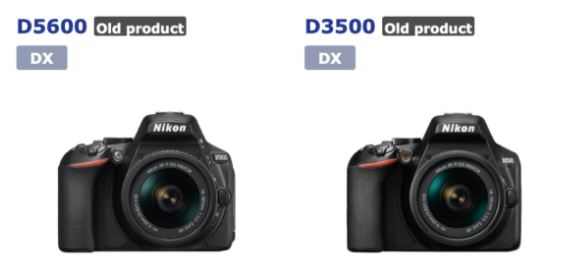
Nikon finally discontinued the Entry-level DX-format line of cameras the Nikon D5xxx and Nikon D3xxx. According to the latest information coming out from the rumor mill now, Nikon officially sent notices to Nikon Stores regarding the discontinuation of their entry-level DSLR lineup.
Nikon Z30 Announcement Soon… ?
Just before the announcement of the Canon R10 and Canon R7 cameras, Canon also officially discontinued the Canon M6 Mark II. To give a strong msg to the consumer base that they should now migrate to RF mount from EF-M Mount.
Future Perfect Decision? Canon M6 Mark II Discontinued
Follow us on our social pages FACEBOOK | TWITTER | INSTAGRAM to get live news + Nikon Rumors 24 X7
By admin, on June 8th, 2022
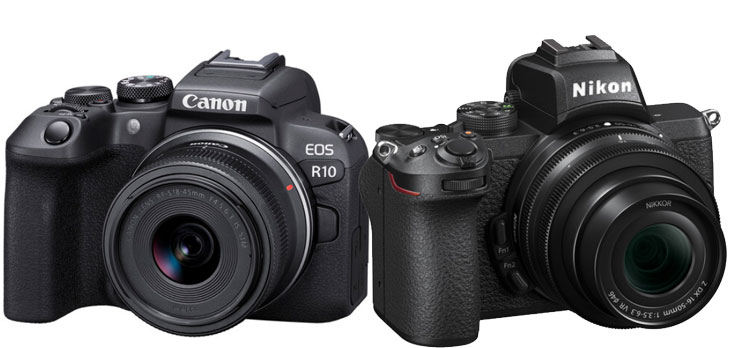
Let’s compare the Canon R10 vs the Nikon Z50 camera. Let’s discuss the major difference between the two. As we know the Canon R10 arrived with a conventional CMOS sensor and due to that Nikon Z50 is able to create space again with its low-light advantage
| Lens Mount |
Canon RF |
Nikon Z |
| Sensor Resolution |
Actual: 25.5 Megapixel
Effective: 24.2 Megapixel |
Actual: 21.51 Megapixel
Effective: 20.9 Megapixel (5568 x 3712) |
| Sensor Type |
22.3 x 14.9 mm (APS-C) CMOS |
23.5 x 15.7 mm (APS-C) CMOS |
| Crop Factor |
1.6x |
1.5x |
| Image Stabilization |
Digital (Video Only) |
Digital (Video Only) |
| Built-In ND Filter |
None |
None |
| Capture Type |
Stills & Video |
Stills & Video |
Image sensor & Low-light performance
Both sensors are made on conventional CMOS Sensor technology. None of them features a BSI sensor. But if we consider the two most important factors that we have here is
1. Expandable ISO range
2. 12% larger sensor pixel in Nikon Z50
Due to the larger pixel area, the sensor can grab more light compared to Canon R10 Sensor. And hence we do expect despite the refinements Canon has done with the R10 sensor despite keeping the sensor core technology the same. We will see at least 1 stop of improvement in the Nikon Z50 low light performance compared to the Canon R10
Canon R10 Has arrived on the market but
If you are more concerned about the low light performance of the camera then even in 2022, Nikon Z50 is an excellent option for photographers.
If ur having doubts about the AF performance then don’t worry the AF performance of the camera is much improved after the Nikon firmware 2.2 updates. The camera is now able to track animals’ eyes too. The overall AI AF of the camera is also much improved.
Slightly more rich Lens ECO system in Nikon – Right now if we compare the Canon RF mount ECO system vs Nikon Z mount ECO system the Nikon is now a collaboration with Tamron and they have started with 28-75 F2.8. Not only that, Viltrox also has an amazing range of Nikon Primes right now.
Nikon APS-C Viltrox Lenses B&H Store
Yes, we do have rumors about Viltrox lenses coming for RF Mount too, but if someone is planning to buy Nikon Z50 right now, then its more feasible to buy the Nikon Z50 camera only for photography purposes (Like weddings, street, and Portraits)
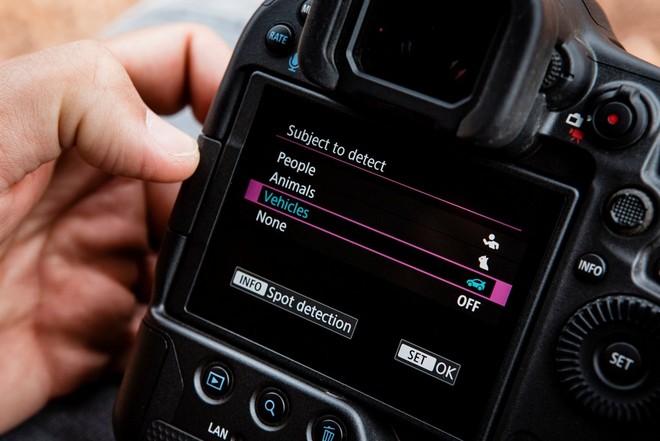
Canon R10 For Sports Shooter. Wildlife Photographers
Canon R10 has just arrived with class-leading AF performance., Canon implemented DPAF gen 2 inside Canon R10 & R7 both. According to Canon’s official press release, the AF performance of the recently announced Canon R10 and Canon R7 cameras is similar to Canon EOS R3 camera. Although we never consider it exactly similar neither they can perform so, due to the lack of a Stacked CMOS sensor like we have in the Canon R3.
651 AF Zones inside Canon R10
Yes, we have 651 AF Zones inside the Canon R10 camera which is comprised of more than 2.9k DPAF points. The AF tracking mode has dedicated 3d subject tracking modes in the Canon R10 camera. Whereas our Nikon Z50 is limited to 205 Hybrid AF points.
Overall, we can say that the AF system of the Nikon Z50 after the arrival of firmware F2.2 has become very usable but the Canon R10 AF system is phenomenal and the best in its class.
| Focus Type |
Auto and Manual Focus |
Auto and Manual Focus |
| Focus Mode |
Continuous-Servo AF, Manual Focus, Single-Servo AF |
Automatic, Continuous-Servo AF, Full-Time Servo, Manual Focus, Single-Servo AF |
| Autofocus Points |
Photo, Video
Phase Detection: 651 AF Zones |
Phase Detection: 209 |
| Autofocus Sensitivity |
-4 to +20 EV |
-2 to +19 EV |
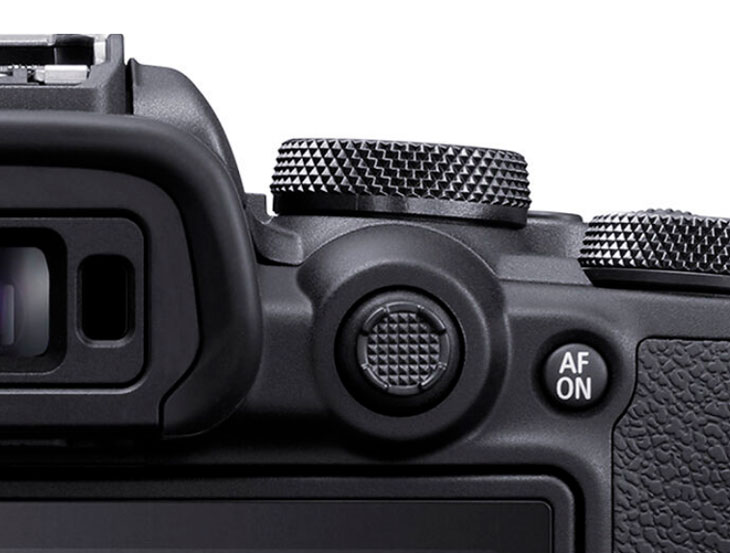
Canon R10 also features a Joystick controller on the rear side of the camera. A helpful tool for professional photographers is now available in the mid-range cameras.
Canon R10 Fastest in its Class
However, being said, if we talk about the stats of the Canon R10 camera, in continuous shooting mode the camera is able to capture 23 Frames @ elec. shutter and 15 FPS with the help of a mechanical shutter. The Buffer depth is also very usable and ur able to capture up to 70 JPEG files @ 23 FPS and up to 450+ files @ 15fps in a single burst.
Either ur shooting at 23 FPS or 15 FPS, the DPAF system is fully active and tracks moving 3d subjects very well.
| Shutter Type |
Electronic Shutter, Mechanical Focal Plane Shutter |
Mechanical Focal Plane Shutter, Electronic Shutter |
| Shutter Speed |
Mechanical Shutter
1/4000 to 30 Seconds
Electronic Shutter
1/4000 to 30 Seconds |
Electronic Front Curtain Shutter
1/4000 to 30 Seconds
Electronic Shutter
1/4000 to 30 Seconds |
| Bulb/Time Mode |
Bulb Mode |
Bulb Mode, Time Mode |
| ISO Sensitivity |
Photo
100 to 32,000 in Manual, Auto Mode (Extended: 100 to 51,200) |
Photo
100 to 51,200 in Auto Mode (Extended: 100 to 204,800)
Video
100 to 25,600 in Auto, Manual Mode |
| Metering Method |
Center-Weighted Average, Evaluative, Partial, Spot |
Center-Weighted Average, Highlight Weighted, Matrix, Spot |
| Exposure Modes |
Aperture Priority, Manual, Program, Shutter Priority |
Aperture Priority, Manual, Program, Shutter Priority |
| Continuous Shooting |
Electronic Shutter
Up to 23 fps at 24.2 MP for up to 70 Frames (JPEG) / 21 Frames (Raw)
Mechanical Shutter
Up to 15 fps at 24.2 MP for up to 460 Frames (JPEG) / 29 Frames (Raw) |
Up to 11 fps at 20.9 MP
Up to 5 fps at 20.9 MP
Up to 4 fps at 20.9 MP
Up to 30 fps at 8 MP |
Best Camera to capture Video
Canon R10 is the best camera to capture High-Quality video, let me explain this. When we are comparing Nikon Z50 and Canon R10 then we will consider both the features and the limitations, let’s discuss the both
Both of them create 4k videos via the oversampling method. Although in Canon R10, we get an option to record 4K 24 / 30 fps video in 10bit format, and in Nikon Z50 we are limited to 8bit. None of them allow us to use Log files from them. And finally, with the Canon R10, we also have an option to record 4K 60p video @ 1.56x crop (although it’s not that usable with the crops factor) but yes we are getting, at least an option that is not available in Nikon Z50 camera.
With Canon HDRPQ mode the Canon R10 is able to record 10Bit videos in H.265 codec @ 170Mbps. So, 10bit in any form is very useful if you know the difference between the 10bit and 8bit video files.
No recording limit, Canon has revoked the recording limit of the recently announced cameras, both the Canon R10 and Canon R7 don’t have any recording limit. But, in the Nikon Z50 camera, we do get a recording time limit of 30min.
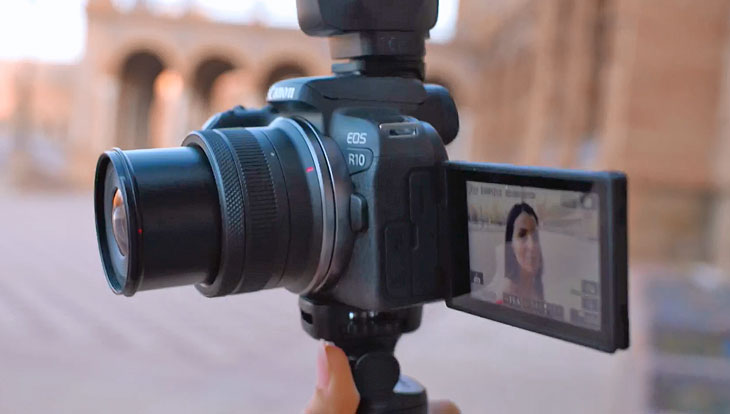
Perfect for Vloggers with a vari-angle display screen.
| Recording Modes |
H.264/MP4 4:2:0 8-Bit
UHD 4K (3840 x 2160) at 23.98p/25p/29.97p/59.94p
Full HD (1920 x 1080) at 23.98p/25p/29.97p/50p/59.94p/100p/119.88p
H.265/MP4 4:2:2 10-Bit
UHD 4K (3840 x 2160) at 23.98p/25p/29.97p/50p/59.94p
Full HD (1920 x 1080) at 23.98p/25p/29.97p/50p/59.94p/100p/119.88p |
MOV/MP4/H.264
UHD 4K (3840 x 2160) at 23.98p/25p/29.97p
Full HD (1920 x 1080) at 23.98p/25p/29.97p/50p/59.94p/100p/119.88p |
| Gamma Curve |
HDR-PQ |
NA |
| Video System |
NTSC/PAL |
NTSC/PAL |
| Limit |
No limit |
30 Min |
| Audio Recording |
MP4: 2-Channel AAC Audio |
AAC Audio
LPCM Audio |
Verdict:
For general purpose photography the Nikon Z50 camera is still usable and you can buy that camera if you want to, the added advantage you will have with the Nikon Z50 camera is the 1 stop better low-light performance. The Z50 AF has improved from the time of announcement and now it has become usable to max extent.
Those Who are Hybrid Shooters (Photo Video both), Contest creators aka YouTubers, Sports shooters, and wildlife photographers, we recommend you to get associated with the Canon R10 camera.
Leatest Price of Canon R10 at B&H Store and Amazon.com | B&H Store
Latest Price of Nikon Z50 B&H | Amazon.com
Also, see – Canon R10 vs Sony ZV-E10
Also, see – Canon R10 vs Sony A6400
See All Comparison & Content Related to Canon R10 Here
Best Lenses for Nikon Z50
More Specs Comparison
| Media/Memory Card Slot |
Single Slot: SD/SDHC/SDXC (UHS-II) |
Single Slot: SD/SDHC/SDXC (UHS-I) |
| Video I/O |
1 x Micro-HDMI Output |
1 x Micro-HDMI Output |
| Audio I/O |
1 x 1/8″ / 3.5 mm TRS Stereo Microphone Output |
1 x 1/8″ / 3.5 mm TRS Stereo Microphone Input |
| Other I/O |
1 x USB Type-C (USB 2.0) Input/Output |
1 x USB Micro-B (USB 3.2 / 3.1 Gen 1) Output |
| Wireless |
2.4 GHz Wi-Fi (802.11b/g)
Bluetooth |
Bluetooth, Wi-Fi |
Monitor
| Size |
3.0″ |
3.2″ |
| Resolution |
1,040,000 Dot |
1,040,000 Dot |
| Display Type |
Free-Angle Tilting Touchscreen LCD |
180° Tilting Touchscreen LCD |
General
| Battery Type |
1 x LP-E17 Rechargeable Lithium-Ion |
1 x EN-EL25 Rechargeable Lithium-Ion, 7.6 VDC, 1120 mAh (Approx. 300 Shots) |
| Tripod Mounting Thread |
1 x 1/4″-20 Female (Bottom) |
1 x 1/4″-20 Female (Bottom) |
| Dimensions (W x H x D) |
4.8 x 3.5 x 3.3″ / 122.5 x 87.8 x 83.4 mm |
4.98 x 3.68 x 2.36″ / 126.5 x 93.5 x 60 mm |
| Weight |
13.5 oz / 382.2 g (Body Only)
15.1 oz / 429.2 g (Body with Battery and Memory) |
13.93 oz / 395 g (Body Only) |
By admin, on June 7th, 2022
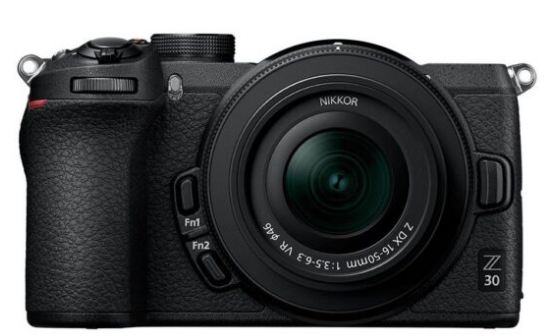
According to the latest rumors surfaced over the web Nikon Z30 Coming soon, the camera is expected to arrive in June 2022. The camera will arrive with the rumored Nikkkor Z 40mm F4.5 Lens. As per Nikon Rumor information Z30 is to be called the successor of Z50 and will feature advanced core specs.
Nikon Mirrorless camera is also expected to arrive with 8K Video capability, and 36-46 MP Sensor Resolution. More details will come soon.
—– End of Rumor ——
TNC Take – As per rumors, we will have an APS-C Mirrorless camera announcement from Nikon. But, at the same time, we are not so sure about the specs of a camera. It’s a high APS-C DX-Format Mirrorless camera OR a Nikon Z30, we need more confirmation over that.
We will publish more information soon.
Follow us on our social pages FACEBOOK | TWITTER | INSTAGRAM to get live news + Nikon Rumors 24 X7
source NR
By admin, on June 3rd, 2022
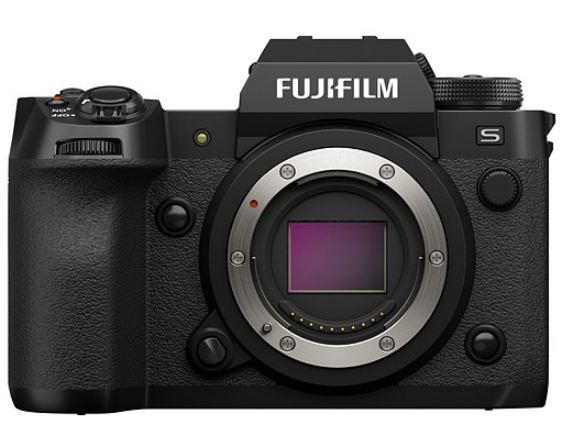
Due to the high amount of pre-orders of the new X-H2S as well as the new 150-600mm lens, the camera supply will be delayed. Take a look at the official press text issued by Fuji
Pre-order Fuji X-H2S from B&H Store | Amazon.com
Notice regarding supply of mirrorless digital camera “FUJIFILM X-H2S” and Fujinon lens “XF150-600mmF5.6-8 R LM OIS WR”
Dear customers
We would like to express our sincere gratitude for your continued patronage of Fujifilm products.
The following products released on July 14th (Thursday) have received more reservations than expected, and it may take some time before the products are delivered.
Mirrorless digital camera “FUJIFILM X-H2S”
FUJINON LENS “XF150-600mm F5.6-8 R LM OIS WR”
We will do our best to deliver it as soon as possible, and we appreciate your understanding.
Follow us on our social pages FACEBOOK | TWITTER | INSTAGRAM, –> See More Fuji Rumors Or subscribe us via Email
By admin, on May 31st, 2022

Fuji announced a new camera today, the camera features a 26 MP stacked CMOS sensor. AF / AE tracking improved vastly due to the 2X faster image processor included inside. The camera has the ability to shoot 40 frames per second with full-time AI AF support. The 40fps and a buffer that allows up to 184 JPEG or 175 Raw files at this fastest rate, and over 1000 JPEGs or 400 Raw images at 15fps using its mechanical shutter.
Fuji X-H2S from B&H Store | Amazon.com
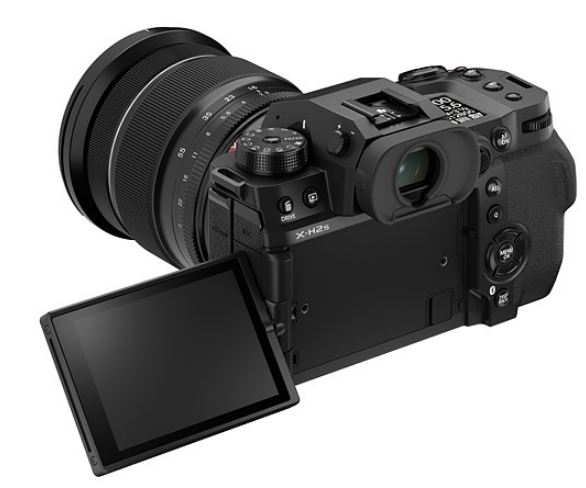
The camera has the ability to Capture 6K video with the help of a new 26Mp Sensor and a new 2X image processor. The X-H2S can capture DCI or UHD 4Kat up to 60p using the entire width of its sensor to give footage sampled from 6.2K width. It can also shoot 3:2 6.2K footage using its entire sensor area or 4K at up to 120p from a 1.29x cropped area. Footage can be recorded in a choice of 8-bit H.264, 10-bit H.625 or ProRes 422HQ, 422 or 422 LT with the option of ProRes Proxy capture in parallel. 4K at up to 120p can be output over HDMI or a Raw stream for encoding as ProRes RAW or BRaw using external recorders. Means a perfect Cinema camera for Fuji Lovers.
An 18-120mm F4 power zoom lens has been launched alongside the camera, as has a 150-600mm F5.6-8.0 super-tele zoom.The Fujifilm X-H2S will be available from early July at a recommended price of $2499.
Fuji X-H2S Press Release
Fujifilm Introduces X-H2S Mirrorless Digital Camera
New flagship camera features enhanced still and video capabilities
Valhalla, N.Y., May 31, 2022 – FUJIFILM North America Corporation today announced the launch of its next flagship X Series mirrorless digital camera, FUJIFILM X-H2S (X- H2S). The most advanced X Series mirrorless camera yet, X-H2S includes advanced features for both still photography and video. It is also the first APS-C digital camera of its kind to feature Fujifilm’s 26.16MP X-TransTM CMOS 5 HS imaging sensor, a stacked, back-side illuminated imaging sensor with a signal reading speed up to four times faster than Fujifilm’s previous X-TransTM CMOS 4*1.
X-TransTM CMOS 5, combined with the newly minted X-Processor 5 (which doubles the camera’s processing power compared to X-Processor 4), greatly enhances overall image fidelity at lower ISOs and reduces noise at higher ISOs. Subject-detection AF, which maximizes the tracking speed and accuracy of moving subjects is now made possible through the incorporation of an AI processor.
For video, X-Processor 5 enables the recording of 10-bit 4:2:2 video in resolutions up to 6.2K/30P and frame rates as fast as 4K/120P and FHD/240p. Support for professional codecs, like Apple ProRes HQ/ Pro Res 422/ Pro Res LT, provide incredible flexibility within post-production workflows, while also minimizing power consumption, thereby extending the camera’s maximum video recording time up to 240 minutes.
“The universal reaction to X-H2S has been, ‘This is exactly what I’ve been waiting for!’ The overwhelmingly enthusiastic response reinforces my belief that X-H2S will be the versatile, hybrid digital camera that can meet the diverse needs of photographers and motion production professionals,” said Victor Ha, vice president, Electronic Imaging and Optical Devices Divisions, FUJIFILM North America Corporation. “It’s fun to see so much enthusiasm for this camera, especially since the features it has aren’t normally found at a price point of only $2499.95.”
With these sensor and processor updates, X-H2S achieves substantial performance improvement over other digital camera models on the market, including:
- Major boost to burst mode capability: X-H2S can apply AF / AE tracking in blackout-free continuous shooting conditions of up to 40 frames per second*2, and can create over 1,000 frames continuously with the high-speed burst shooting mode set to 30 frames per second (JPEG) or 20 frames per second (RAW)*3
- Dramatically evolved autofocus (AF) performance: X-H2S’s high number of AF calculations performed per second improves overall AF accuracy and facilitates subject-detection AF. Developed with Deep Learning technology, subject-detection AF implements an advanced prediction algorithm to enhance the performance of Zone AF, by refining the camera’s ability to track moving subjects in low-contrast environments. Subject detection and tracking has also been expanded from the human face and eyes to now include animals, birds, cars, motorcycles, bicycles, airplanes and trains. X-H2S keeps targeted subjects consistently in focus, allowing users to concentrate on framing and critical image-making opportunities.
- Exceptional video performance: X-H2S digital camera supports internal recording of 4:2:2, 10-bit Apple ProRes HQ/ ProRes 422/ ProRes LT and ProRes 422 Proxy at resolutions of up to 6.2K/30P and 4:2:2, 10-bit h.265video in frame rates as fast as 4K/120P and FHD/ 240p. The sensor’s readout speed of 1/180 seconds when recording video further assists in minimizing rolling shutter effects on moving subjects, or when the camera itself is moving. A heat-dissipating design brings the 4K/60P continuous video recording time to approximately 240 minutes, while the optional FAN-001 cooling fan accessory assists with maintaining similar levels of performance in high-temperature conditions.
- Significant flexibility for external recording: X-H2S is the first X Series digital camera to contain F-Log2, which provides a dynamic range of up to 14+ stops, allowing for more creative possibilities both in production and post-productionworkflows.
Additional Product Features:
Best subject tracking in X Series history
- X-H2S controls phase-detection pixels independently from image display when in burst mode. This triples the number of calculations in phase detection from the acclaimed FUJIFILM X-T4 and enables high-speed focusing even during high-speed continuous shooting.
- X-H2S’s electronic viewfinder uses a high-resolution, 5.76-million-dot panel with a magnification of 0.8x. With a frame rate of approximately 120fps, the smooth viewfinder offers stellar visibility as a result of strong suppression of parallax and distortion (which commonly occurs when an eye position becomes displaced while using the viewfinder), thereby enabling accurate subject tracking.
Thoughtful design to enhance users’ content creation experience
- The camera features an all-new five-axis, in-body image stabilization mechanism, which offers up to 7.0-stops of image stabilization*4. Users can comfortably choose to operate the camera handheld in active environments (e.g., sports) or in low-light conditions (e.g., nightscape).
- X-H2S incorporates the popular design features of Fujifilm’s previous X-H1 model, such as a large grip that works well with large lenses, an LCD display on the top panel for users to check settings at any time, and a highly-robust body that withstands heavy professional use. Many additional improvements have also been included in the design and construction of X-H2S:
- The shutter button’s overall feel has been adjusted to improve its operability when it is half-pressed. This allows users to release the shutter exactly when intended.
- A standalone video recording button has been added to make the experience of recording video with the 1.62-million-dot, vari-angle LCD monitor a seamless experience.
- From the fit and finish of the buttons and materials used in the construction of X-H2S to being able to map specific functions to the AF ON button, image-makers will find the experience of using X-H2S intuitive and familiar. Shutter durability has been optimized, withstanding 500,000 actuations during quality and performance testing.
- The camera features dual memory card slots supporting one CFexpressTM Type B and one SD card*5. Users can draw out the full potential of X-H2S’s fast, continuous image-making and video performance with the high-speed data processing performance of CFexpressTM Type B memory cards.
X-H2S Accessories
Several new accessories are also being introduced to complement the launch of X- H2S. These optional accessories include:
Vertical battery grip (VG-XH)
- Dust- and moisture–resistant and is designed to operate at temperatures as low as 14 degrees Fahrenheit (-10 degrees Celsius). It fits two FUJIFILM NP-W235 high-capacity batteries.
- The grip’s button layout is designed to provide equal operability whether holding the camera vertically or horizontally.
File transmitter (FT-XH)
- Features wired LAN connectivity and high-speed wireless communications capability, essential for in-studio tethered content creation or for creating sports/media content. It can also be used as a vertical grip using two FUJIFILM NP-W325 high-capacity batteries.
- It can be combined with X-H2S to support the following communication specifications:
- FTP transfer by wired LAN / wireless LAN / USB Smartphone tethering
- Tethered shooting by wired LAN / wireless LAN
- Remote recording function by wired LAN / wireless LAN; capable of controlling up to four X-H2S cameras from a browser at the same time
Cooling fan (FAN-001)
- Specifically designed for the X-H2S to facilitate extended image creation and video recording in high temperatures.
- The fan can be fitted to the rear of the camera body without a cable, supplying power, extending continuous video recording time at high temperature, and eliminating concerns of heat-related camera shutdown.
Cover kit (CVR-XH)
- Protects various terminals on the camera. Items contained in this kit:
- 1x Sync terminal cover
- 1x Hot shoe cover
- 1x File transmitter / vertical battery grip terminal cover
- 1x Cooling fan terminal cover
- 1x Memory card slot cover
Pricing and Availability:
FUJIFILM X-2HS mirrorless digital camera is expected to be available in early July 2022 at the Manufacturer’s Suggested Retail Price of $2,499 USD and $3,200 CAD.
Pricing and expected availability for X-2HS accessories are as follows:
VG-XH Vertical Battery Grip: Available early July 2022 at a Manufacturer’s Suggested Retail Price of $399 USD and $515 CAD.
FT-XH File Transmitter: Available in September 2022 at a Manufacturer’s Suggested Retail Price of $999 USD and $1,280 CAD.
FAN-001 Cooling Fan: Available early July 2022 at a Manufacturer’s Suggested Retail Price of $199 USD and $260 CAD.
CVR-XH Cover Kit: Available early July 2022 at a Manufacturer’s Suggested Retail Price of $19.99 USD and $26 CAD.
By admin, on May 28th, 2022
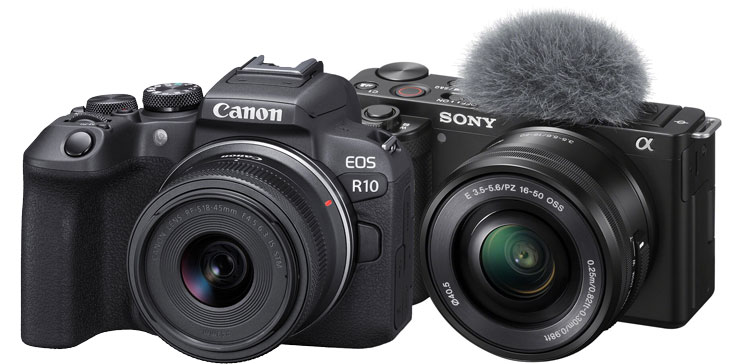
Canon R10 is a recently announced Hybrid camera. And Sony ZV–E10 is a dedicated V-logging interchangeable Lance camera. So which one of these is more suitable for photography and which one is more recommended for videography and cinematography?
Let’s discuss some basics: The Canon R10 and the Sony’s ZV E10 camera uses conventional CMOS sensors, none of these cameras are equipped with a BSI or a stacked CMOS sensor. At the same time, the resolution of both the cameras is exactly the same.
Updated Image Sensor in Canon R10
Canon has updated the microlens structure of their 24.2 mp APS-C CMOS sensor, so we may expect a little bit more sharpness from the canon R10 camera. All though we have to wait for studio test results to confirm this feature.
Now in photography not only image quality, but The autofocusing system is also a very important or integral part of the entire process
|
Canon R10 |
Sony ZV-E10 |
| Lens Mount |
Canon RF |
Sony E |
| Sensor Resolution |
Actual: 25.5 Megapixel
Effective: 24.2 Megapixel |
Actual: 25 Megapixel
Effective: 24.2 Megapixel (6000 x 4000) |
| Sensor Type |
22.3 x 14.9 mm (APS-C) CMOS |
23.5 x 15.6 mm (APS-C) CMOS |
| Crop Factor |
1.6x |
1.5x |
| Image Stabilization |
Digital (Video Only) |
Digital (Video Only) |
| Built-In ND Filter |
None |
None |
| Capture Type |
Stills & Video |
Stills & Video |
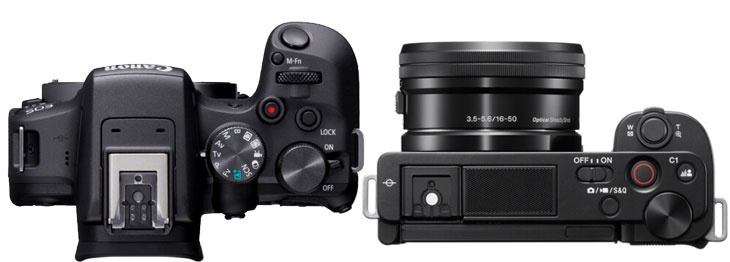
Autofocusing System
We know that both Canon and Sony make the world’s best autofocusing systems. But this time Canon has upscaled the dual pixel CMOS autofocusing system even in the mid-range camera. Now we are getting the 2nd generation of dual pixel CMOS autofocusing system in Canon R10. camera. And dedicated tracking modes to track animals, vehicles which include moving cars motorbikes, etc., as well as an artificially intelligent AF force to track any 3D moving subject.
| Focus Type |
Auto and Manual Focus |
Auto and Manual Focus |
| Focus Mode |
Continuous-Servo AF, Manual Focus, Single-Servo AF |
Automatic, Continuous-Servo AF, Direct Manual Focus, Manual Focus, Single-Servo AF |
| Autofocus Points |
Photo, Video
Phase Detection: 651 |
Phase Detection: 425
Contrast Detection: 425 |
| Autofocus Sensitivity |
-4 to +20 EV |
-3 to +20 EV |
Canon R10 features 651 Autofocusing zones in the sensor and is fabricated with 3975 AF points. Sony Hybrid AF points and limited to 451 as well as contrast-detect AF points. So, if we compare both then Canon R10 does leads in core specs of the AF system. Although we have to also consider the Sony ZV-E10 camera also features a dedicated vlogging mode which is more usable to vloggers.
Burst mode – Canon RF features an electronic and mechanical shutter, the Max shooting speed is 23 Frames per second, up to 70 Frames (JPEG) / 21 Frames (Raw). And with a mechanical shutter, you are able to capture 15fps per second at 24.2 MP for up to 460 Frames (JPEG) / 29 Frames (Raw). Sony ZV-E10’s continuous shooting speed is limited to Up to 11 fps at 24.2 MP for up to 116 Frames (JPEG) / 46 Frames (Raw).
|
Canon R10 |
Sony ZV-E10 |
| Shutter Type |
Electronic Shutter, Mechanical Focal Plane Shutter |
Mechanical Focal Plane Shutter, Electronic Shutter |
| Shutter Speed |
Mechanical Shutter
1/4000 to 30 Seconds
Electronic Shutter
1/4000 to 30 Seconds |
Mechanical Shutter
1/4000 to 30 Seconds
1/4000 to 1/4 Second in Movie Mode |
| Bulb/Time Mode |
Bulb Mode |
Bulb Mode |
| ISO Sensitivity |
Photo
100 to 32,000 in Manual, Auto Mode (Extended: 100 to 51,200) |
Photo
100 to 32,000 in Auto Mode (Extended: 50 to 51,200)
Video
100 to 3200 |
| Metering Method |
Center-Weighted Average, Evaluative, Partial, Spot |
Center-Weighted Average, Multi-Zone, Spot |
| Exposure Modes |
Aperture Priority, Manual, Program, Shutter Priority |
Aperture Priority, Auto, Manual, Program, Shutter Priority |
| Exposure Compensation |
-3 to +3 EV (1/3, 1/2 EV Steps) |
-5 to +5 EV (1/3, 1/2 EV Steps) |
| Metering Range |
-2 to 20 EV |
-2 to 20 EV |
| White Balance |
Presets: Auto, Cloudy, Color Temperature, Custom, Daylight, Flash, Fluorescent (White), Shade, Tungsten |
Presets: Auto, Cloudy, Color Temperature Filter, Custom, Daylight, Flash, Fluorescent (Cool White), Fluorescent (Day White), Fluorescent (Daylight), Fluorescent (Warm White), Incandescent, Shade, Underwater |
| Continuous Shooting |
Electronic Shutter
Up to 23 fps at 24.2 MP for up to 70 Frames (JPEG) / 21 Frames (Raw)
Mechanical Shutter
Up to 15 fps at 24.2 MP for up to 460 Frames (JPEG) / 29 Frames (Raw) |
Up to 11 fps at 24.2 MP for up to 116 Frames (JPEG) / 46 Frames (Raw) |
| Interval Recording |
Yes |
Yes |
| Self-Timer |
2/10-Second Delay |
2/5/10-Second Delay |
Video Capture
Canon R10 now captures oversampled 6k, and the camera also has the ability to capture 10BIT 4:2: videos in HDRPQ mode (output under MP4 wrapper), but at the same time, we have to admit the fact that no CLog is available in the camera… So now you can record high-quality 4k oversampled 10bit videos @ 24 and 30fps from the Canon R10 Camera. There is also an option to capture 4K 60p videos but at the same time, the video is excessively cropped so not so usable. Canon revoked the 30min time limit on the Canon R10 camera, for super slo-mo videos you also have an option to record Full HD Videos up to 120 FPS (With DPAF and no crop).
Sony ZV-E10 camera – Very suable camera at its price range, it does adore all bell and whistles that Camera perfect vlogging camera should have. But missing the 10-bit video recording mode like the Canon R10 camera. Sony ZV-E10 also does oversample and records videos up to 4k 60fps. We also have dedicated VLogging AF modes, like Product priority AF and beauty filters too.
|
Canon R10 |
Sony ZV-E10 |
| Recording Modes |
H.264/MP4 4:2:0 8-Bit
UHD 4K (3840 x 2160) at 23.98p/25p/29.97p/59.94p
Full HD (1920 x 1080) at 23.98p/25p/29.97p/50p/59.94p/100p/119.88p
H.265/MP4 4:2:2 10-Bit
UHD 4K (3840 x 2160) at 23.98p/25p/29.97p/50p/59.94p
Full HD (1920 x 1080) at 23.98p/25p/29.97p/50p/59.94p/100p/119.88p |
XAVC S 4:2:0 8-Bit
UHD 4K (3840 x 2160) at 24.00p/25p/29.97p [60 to 100 Mb/s]
Full HD (1920 x 1080) at 23.98p/25p/29.97p/50p/59.94p/100p/119.88p [16 to 100 Mb/s] |
| Gamma Curve |
HDR-PQ |
Unlimited for UHD 4K (3840 x 2160) at 29.97p |
| Video System |
NTSC/PAL |
NTSC/PAL |
| Built-In Microphone Type |
Stereo |
Stereo |
| Audio Recording |
MP4: 2-Channel AAC Audio |
XAVC S: 2-Channel LPCM Audio |
Added Advantage
Headphone port – Being more affordable than the Canon R10 Camera, the Sony ZV-E10 features a dedicated headphone port to monitor the audio which is absent in the Canon R10 Camera. Another added advantage is a built-in High-Quality microphone, the ZV-E10 features a high-Quality microphone that is able to cut the external noise and will allow you to enter a clear voice only.
| Media/Memory Card Slot |
Single Slot: SD/SDHC/SDXC (UHS-II) |
Single Slot: SD/SDHC/SDXC/Memory Stick Duo Hybrid (UHS-I) |
| Video I/O |
1 x Micro-HDMI Output |
1 x Micro-HDMI Output |
| Audio I/O |
1 x 1/8″ / 3.5 mm TRS Stereo Microphone Output |
1 x 1/8″ / 3.5 mm TRS Stereo Headphone Output
1 x 1/8″ / 3.5 mm TRS Stereo Microphone Input |
| Other I/O |
1 x USB Type-C (USB 2.0) Input/Output |
1 x USB Type-C (USB 3.2 / 3.1 Gen 1) Input/Output (Shared with Power Input) |
| Wireless |
2.4 GHz Wi-Fi (802.11b/g)
Bluetooth |
2.4 GHz Wi-Fi (802.11b/g)
Bluetooth |
| Global Positioning (GPS, GLONASS, etc.) |
Bluetooth, Wi-Fi |
Bluetooth, Wi-Fi |
|
None |
None |
Monitor
| Size |
3.0″ |
3.0″ |
| Resolution |
1,040,000 Dot |
921,600 Dot |
| Display Type |
Free-Angle Tilting Touchscreen LCD |
Articulating Touchscreen LCD |

Viewfinder for Photographers
The viewfinder is completely absent in the Sony ZV-E10 camera whereas in Canon R10 features an EVF of 2.36 Million dot EVF and even in that you have an OVF mode for those who have a habit of using OVF in DSLRs.
| Type |
Built-In Electronic (OLED) |
| Resolution |
2,360,000 Dot |
| Eye Point |
22 mm |
| Coverage |
100% |
| Magnification |
Approx. 0.95x |
| Diopter Adjustment |
-3 to +1 |
Flash – Canon R10 supports internal flash whereas the ZV-E10 doesn’t have internal flash.
| Built-In Flash |
Yes |
No |
| Guide Number |
19.7′ / 6 m at ISO 100 |
Auto, Fill Flash, Off, Rear Sync, Slow Sync |
| Maximum Sync Speed |
1/250 Second |
1/160 Second |
| Flash Compensation |
-3 to +3 EV (1/3, 1/2 EV Steps) |
-3 to +3 EV (1/3 EV Steps) |
| Dedicated Flash System |
eTTL |
TTL |
| External Flash Connection |
Smart Hot Shoe |
Intelligent Hot Shoe |
General
| Battery Type |
1 x LP-E17 Rechargeable Lithium-Ion (Approx. 350 Shots) |
1 x NP-FW50 Rechargeable Lithium-Ion, 7.2 VDC, 1080 mAh (Approx. 440 Shots) |
| Tripod Mounting Thread |
1 x 1/4″-20 Female (Bottom) |
1 x 1/4″-20 Female (Bottom) |
| Dimensions (W x H x D) |
4.8 x 3.5 x 3.3″ / 122.5 x 87.8 x 83.4 mm |
4.5 x 2.5 x 1.8″ / 115.2 x 64.2 x 44.8 mm |
| Weight |
13.5 oz / 382.2 g (Body Only)
15.1 oz / 429.2 g (Body with Battery and Memory) |
12.1 oz / 343 g (Body with Battery and Memory) |
Check the Latest Price & Stock status at – Canon R7 at B&H Store | Canon R7 at Amazon.com
Check the Latest Price & Stock status Sony ZV-E10 B&H Store | Sony ZV-E10 Amazon USA
Conclusion
For Still Shooters – If ur a photographer then yes Canon R10 features a perfect handgrip, an EVF. And also you get HDRPQ (HEIF) format for stills. And the ability to capture faster frames up to 23 fps and with a mechanical shutter up to 15 fps. And advance 2nd gen DPAF system with different modes and a larger AF group for perfect 3d subject tracking. I am not comparing image quality here since both of these cameras carry conventional CMOS sensors, so more or less both of them will produce similar output.
Recommendation – Camera Wise – Canon R10 Seems to be a perfect choice for photographers.
Best Video Camera The ability to record 10bit video makes Canon R10 a perfect camera for Videographers, beginner cinematographers, and Vloggers. Although the 10bit is limited to MP4 wrapper, yes you will get more details and latitude in your files compared to an 8bit file from ZV-E10. Although the Sony ZV-E10 does offer S-log profiles even those that are limited to 8-bit format. And yes an option to record in ALL-I Intra format whereas the Canon R10 recording formats in 4K are limited to IPB and IPB Light.
If Sony ZV-E10 was able to give us 10bit in any way, I would here definitely recommend the ZV-E10 camera for Video work. but since the camera is limited to 8bit only, So R10 is able to make a perfect space here with its HDRPQ 10-bit mode. Decide yourself, I would recommend you to get a 10bit camera since 8-bit videos can display over 16.7 million colors. When you switch to a 10-bit video, you can use more than 1 billion colors for your footage.
But if we consider the LENS ECOSYSTEM – We know that the Canon Lens mount is still closed to third-party lens makers, and at the same time, we have multiple options for Sony since they have publicly opened their E-Mount in 2018.
So, lenses like Sigma 18-50mm F2.8 | Tamron 17-70mm F2.8 | Primes like Sigma 56mm F1.4 | 30mm F1.4 and 16mm F1.4 always attract eyes over them. The list doesn’t end here we have more than dozen of popular APS-C lenses for the Sony E-Mount camera.
In Canon, if you already own Canon DSLR Lenses, then for sure you should only buy the Canon R10 Camera.
Final Verdict – If the available set of lenses and Price of Canon R10 fits to your budget and requirements for with Canon R10 Camera then, otherwise ZV-E10 is a decent option to have if available.
By admin, on May 26th, 2022
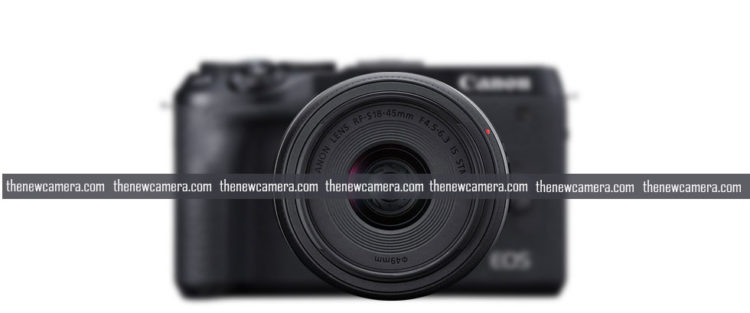
Canon just announced the Canon R10 and Canon R7 cameras. If you look at the chronological names then in the base area we have only two positions left after the Canon R6, and the first one is the Canon R8, and 2nd one Canon R9 camera?
1. Canon Upcoming Cameras 2022-2023
Upcoming camera names are in BOLD
- Canon R1 – Canon Flagship Camera / Development announcement on Q4 of 2022
- Canon R2 – No info available
- Canon R3 – Canon FF Sports / Wildlife camera
- Canon R4 – No info available
- Canon R5 – Replacement of Canon 5D Series
- Canon R6 – Canon R6 is a perfect combo of speed and performance
- Canon R7 – Canon 7D Series replacement
- Canon R8 – Possible replacement of Canon EOS R
- Canon R9 – Possible Replacement of Canon EOS Rp
- Canon R10 – Replacement of Canon M6 Mark II
- Canon R100 – Canon Rebel Series arrival in RF Mount @ Q4 of 2023
2. Canon EOS R1 Arrival Date
We are keeping away the Canon R1 camera from our expectation list since we have a lot of info related to the upcoming flagship camera and we are almost sure, that the development announcement is about to happen in Q4 2022 and a full-fledged announcement will happen in the beginning months of 2023.
Canon EOS R1 Specification: Initial rumor suggests that canon does have working prototypes of the Canon R1 camera with a 45-megapixel stacked CMOS sensor. The camera can capture 45 megapixels of images at 30 frames per second with unlimited buffer memory and is also capable of recording 8k videos up to 60 fps. But yes keep in mind camera makers always test several prototypes of a flagship camera before putting it over on the production line. We are keeping an eye on rumors and as soon as we get more information related to them we will be posting on this website.
3. Canon R9
Now let’s talk about the Canon EOS RP replacement. This is not exactly an expectation. it’s a kind of a tip we have, Canon EOS RP camera replacement name is Canon R9. We are not expecting a big jump in the core specs of the camera. All it will have a mediocre update with Digic x image processor, and proper 4K video recording mode up to 30fps.
4. Canon R8
The possible name of the upcoming Canon EOS R camera successor would be Canon R8. And again if you talk about the specification then yes we are again expecting a mediocre update with an improved image processor and possibly the same sensor with updated microlenses
5. Canon R100
According to the latest rumor surfaced over the web Canon is expected to announce the Canon R100 camera in Q3-Q4 of 2023. The Canon R100 camera will replace the Rebel series of DSLRs. And will provide a more affordable option than the Canon EOS R10.
Get LIVE RUMORS –> FACEBOOK | TWITTER | INSTAGRAM to get live news + Canon rumors 24X7
|
KEEP THIS BLOG ALIVE - Support New Camera Buy Canon Lenses, Buy Music CD or Digital Camera at amazon it helps this site, and you do not pay anything extra, it is just a way to help support this site.

|

















